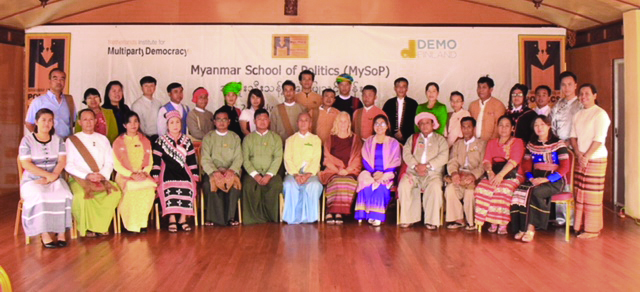
The Myanmar School of Politics (MySoP) is proud to announce the opening of its 12th Core Course, an intensive political training course in Shan State, Myanmar.
Shan State is home to many ethnic groups. It is the largest of Myanmar’s 14 administrative divisions by land area and covers almost a quarter of the country.
The Core Course will be attended by 28 trainees, namely state-level senior politicians from 14 political parties along with one official from the Election Sub Commission (Shan State, South).
During the opening ceremony, keynote speeches were given by H.E. Riikka Laatu, Ambassador of the Embassy of Finland in Myanmar and Htin Kyaw, Chair of the Election Sub Commission (Shan State, South).
“The multiparty system is an effective mechanism introduced to Finnish political parties to retain peace and development in the country” said H.E. Laatu, reflecting on the political history of Finland. “I am happy to come to MySoP Core Course events and have the chance to meet with state-level politicians and we look forward to supporting future MySoP core courses.”
“In democracy, political parties and Election Commission work together to ensure elections are held accountably and peacefully,” said Mr. Kyaw. “As the MySoP Core Course is a multiparty setting embracing the opinions of all political parties based in Shan State (South), I encourage all trainees to respect and listen each other opinions and have constructive dialogue during the course.”
About MySoP
MySoP is one of NIMD’s numerous schools around the worlds. Run jointly with Demo Finland, the school strengthens the democratic functioning of political parties and promotes multiparty dialogue at the regional and state levels. The 17-day long training programme enhances the political knowledge and capacity of the participants, and supports dialogue among the different political parties based on the principle of multiparty democracy. The course emphasizes political theory and multiparty cooperation as well equipping participants with skills such as policy-making, speechwriting, political dialogue, debate, and campaigning.
